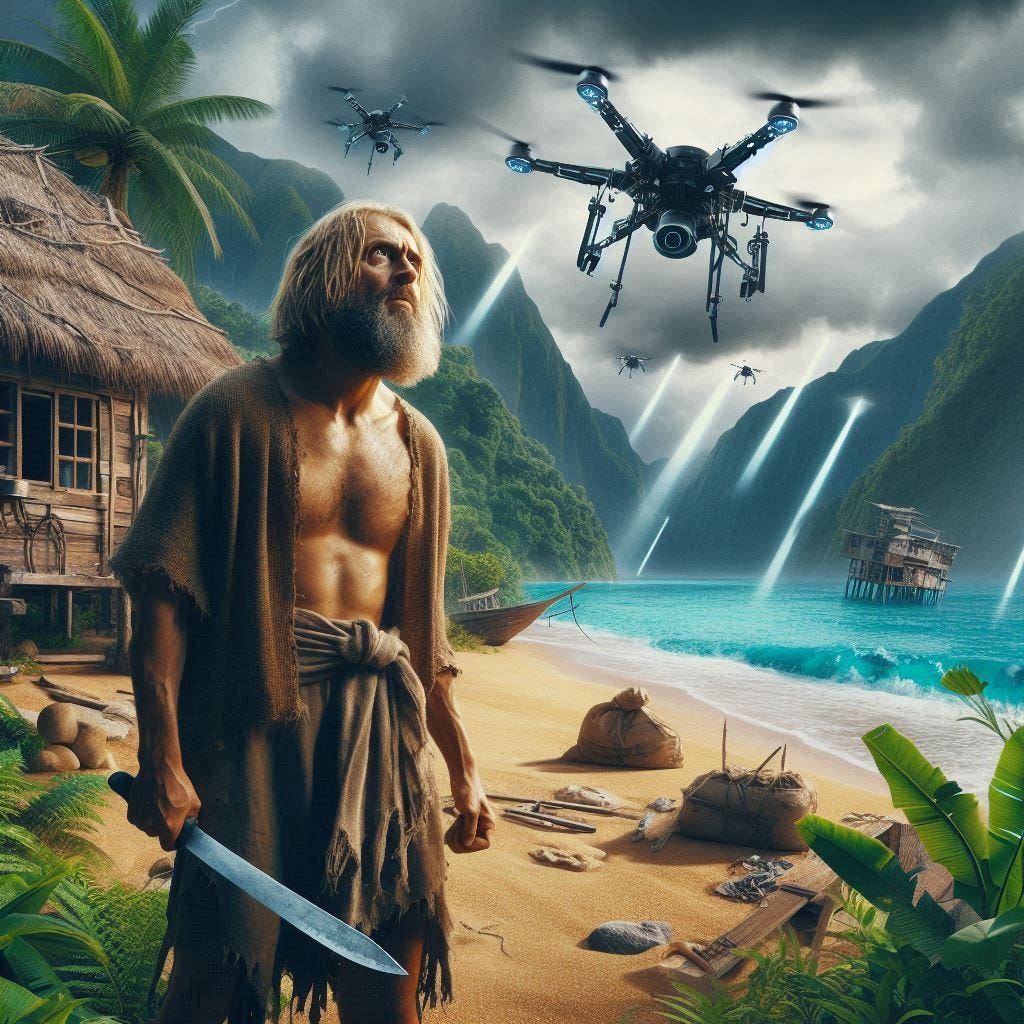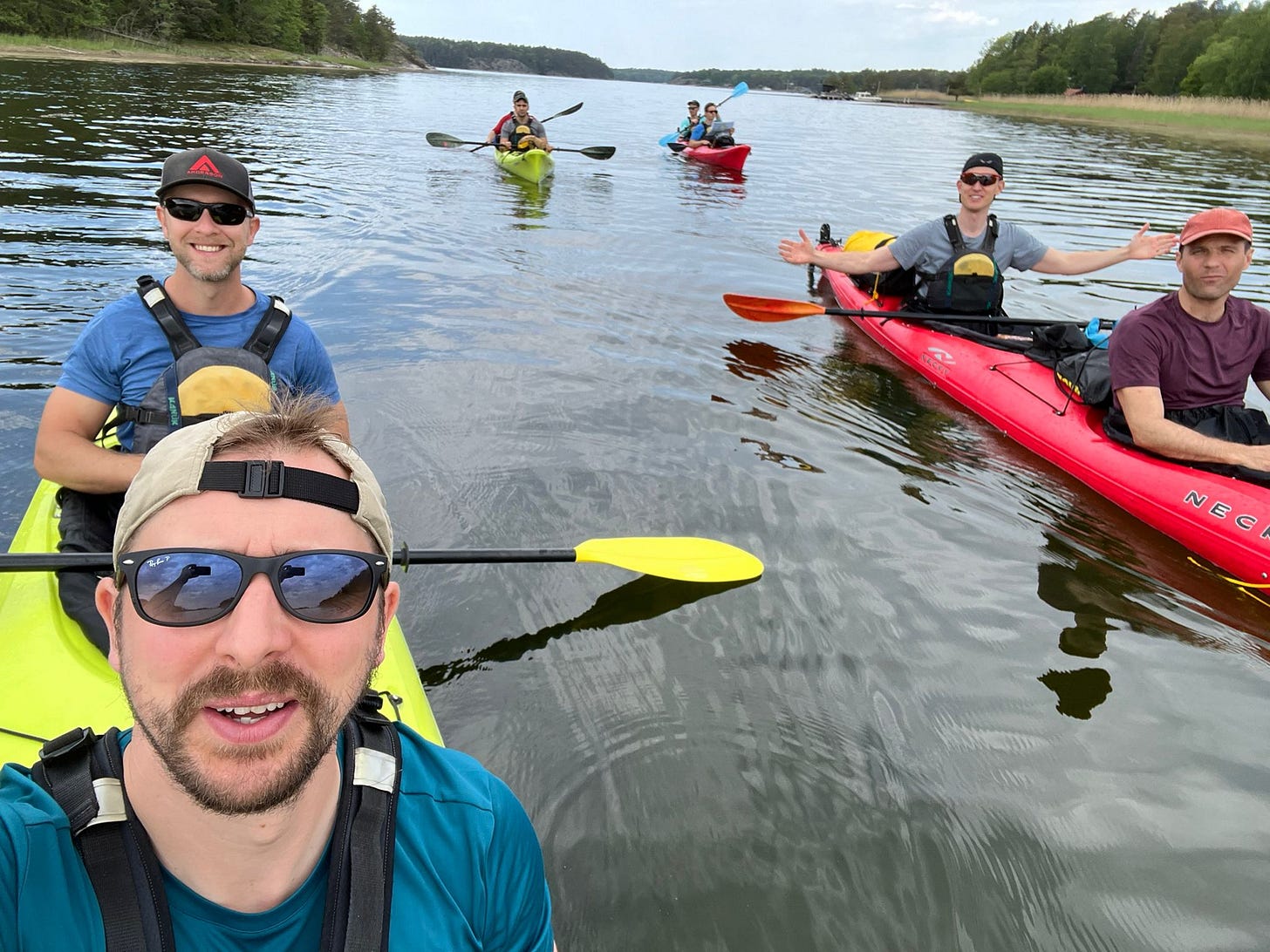Most of my network is excited about AI. Allow me to play devil's advocate.
What will you do for a living when AI makes us redundant – not if, but when? Discuss.
Eight Jobs, One Concern
I discussed this question in depth last year, on a kayaking trip in Sweden, with a professionally diverse group of university friends: exited founder, surgeon, research lecturer, wealth manager, tech operator, schoolteacher, investment executive, and me. It was interesting to have that discussion far from our desks while, in a low-risk sense, surviving and trying to thrive as a human ‘tribe’ – just us and the great outdoors.
It turned out all of us have misgivings about AI. Six of the group are fathers and are concerned for their children’s future; all of us think AI will take over certain aspects of our work; and some of us predict it will spell the end for humanity... eventually.
Now I’m not an alarmist – I don’t think the apocalypse is nigh – but change is afoot and it shouldn’t come as a surprise. People are already losing work to automation1, roles are becoming more specialised2; and the jobs most undersupplied with candidates, in this volatile economy where redundancies are rising3 and new vacancies dwindling4, are for tech and product specialists to build more AI5.
Prompt with Caution
According to my LinkedIn feed, AI can: ship code, write copy, design graphics, market on socials, sell via every channel, run ops processes, analyse data, draft legal contracts, coach managers, improve mental health, and about a hundred other functions. I don’t believe AI will supplant humans in all these functions next week, even next year; in the next decade though, I think the job market will look very different. AI clearly has many use-cases and great potential to increase productivity6, especially when it comes to discrete, repetitive and/or scalable administrative tasks. The more we allow it to do, the more it will learn and the more capable it will become.
At the same time, I think it's wise to be measured and critically evaluate any new technology. For starters, most of the people I see shouting about the limitless and immediate benefits of AI are selling it – either as a product or a service. Are they seriously considering its downsides and limitations, and the longer term implications for the future of humanity, or are they rushing to make a buck while they can?
I've recently been on the receiving end of an awful lot of clearly AI-generated emails, messages, posts, CVs, cover letters, decks, designs, analyses, etc. that are largely mediocre, often crap, and rarely exceptional. Some were so poor that I chose not to pursue projects or client relationships with individuals or companies, such did it make me question their judgement or competence. New research suggests AI, amongst other technologies, may be undermining human intelligence7. This drives my skepticism of AI, although it reminds me I need to educate myself about its potential.
I consider myself an AI novice and, since my primary role as a mentor relies mainly on people skills and critical thinking, I don't have much cause to use it professionally. I did use Bing to generate the image for this article; although it took me several frustrating iterations to get a satisfactory result, finally settling on this pithy prompt: “balding blonde bearded Robinson Crusoe dressed in rags holding machete, with no technology, alone in a shack on a lush desert island in the foreground, hiding as the rest of humanity is destroyed by an evil AI robot drone apocalypse in the background”.
Where it is relevant, I advise mentees to use AI with focus and caution. I'm certainly doubtful about its current capacity to substantively impact strategic generalist work, which inherently relies on strong communication and leadership i.e. human relationships. It can significantly speed up and streamline administration, but human attributes remain critically important; and that’s a good thing in terms of job preservation. Personally, I also love to think, create, analyse, write and converse; I don't have much interest in delegating that to a machine. Each to their own, I suppose.
Human Utopia or AI Dystopia?
I become really skeptical when people evangelise about AI with wanton optimism. The positive outlook is that AI will take over the boring and repetitive aspects of our work, so we'll have more time to do the fun stuff and enjoy our lives. As wonderful as that sounds, and as much as I’d like to believe it, I’m afraid I’m inclined to call bullshit.
Wealth and power are already highly concentrated, and are fast becoming more so. Why would the ultra-wealthy, who ultimately own the companies we work for, pay us generous salaries to have a jolly while AI does the bulk of our work for pennies? It doesn't make commercial sense, and I’d go further and suggest it's a utopian dream. There may be a temporary improvement in salaries and work-life balance for the middle classes, especially for AI specialists, but I find it hard to believe it will last very long. It’s well worth reading this detailed hypothetical narrative, conceived by a group of leading AI experts, which plays out the dystopian scenario of AI takeover – AI 2027.
We're already training AI to replace us – us being knowledge economy workers, like my kayaking tribe. Any human job based on learning, analysing and communicating information is a potential candidate for redundancy, and I’m not convinced there will be enough alternative jobs available to sustain our comfortable middle-class lifestyles.
I may well be wrong, and I'm not suggesting this mass human redundancy will happen quickly. I think it will happen in stages, but I’m sure there will be radical step changes in AI that change the nature of work within my lifetime. The AI revolution will ultimately create new industries, and possibly enough new jobs for us to transition into, but I do think the fathers in the group are wise to be concerned about their children’s careers.
Future of Work or Not Enough Work?
What jobs will be left to humans in the long term worst-case scenario? My best guess:
Top 10% of humans – ultra-wealthy tech owners and investors, and enough executives and technical specialists8 to manage AI, robots and surviving human roles.
“Middle” 20% – roles it's not desirable to automate, or which have a critical in-person element e.g. nurse, specialist teacher, artist, vocational instructor, tradesperson.
Bottom 70% – jobs it's cheaper for a human to do than a robot e.g. labourer, server, carer, gardener, installer; especially in developing regions where AI will be slower to take over (a smaller or poorer population makes automation less commercially viable). NB: many in this lower tier could be unemployed, if there’s fewer roles than humans.
Of course, I could be entirely wrong and we’ll all have wonderfully easy well-paid jobs.
Tell Me I’m Wrong
What am I going to do? Maybe move to a desert island and live out my days in a shack, far from the robot hordes... I guess I’ve been planning ahead! Seriously though, whether you choose to embrace AI or insulate yourself from it, it pays to understand the implications of what is shaping up to be the biggest technological shift in history.
As I said, I consider myself an AI novice. I would appreciate your insights, especially if you disagree with my perspective or know something I don’t. I’m also looking for books, podcasts, articles and talks to add to my reading list. Please comment!
https://www.mckinsey.com/featured-insights/future-of-work/jobs-lost-jobs-gained-what-the-future-of-work-will-mean-for-jobs-skills-and-wages
https://www.weforum.org/publications/the-future-of-jobs-report-2023/
https://www.cipd.org/uk/knowledge/reports/labour-market-outlook/
https://www.ons.gov.uk/employmentandlabourmarket/peopleinwork/employmentandemployeetypes/bulletins/jobsandvacanciesintheuk/april2025
https://www.bain.com/insights/ai-the-ambitions-are-bold-but-the-talent-is-scarce-snap-chart/
https://post.parliament.uk/technologies-and-artificial-intelligence-in-the-workforce/
https://www.theguardian.com/technology/2025/apr/19/dont-ask-what-ai-can-do-for-us-ask-what-it-is-doing-to-us-are-chatgpt-and-co-harming-human-intelligence
https://www.weforum.org/stories/2023/09/jobs-ai-will-create/





I think you've made some good points here - particularly the bit about the top 0.01% not being particularly likely to want to subsidise comfortable lives for the rest of us - but not sure it's quite as bad as you say.
I have no stake in AI, but am finding it really useful for a lot of things (particularly idea generation, finding gaps that I've missed, and stimulating my own thoughts). It's a useful short term replacement for having someone sat next to you - you don't get quite the same buzz of collaboration, but you do get a huge vat of knowledge and something to bounce ideas off. Agree with you that it is being used lazily to create tedious cookie-cutter content.
Re: future of work - is AI fundamentally different to any other mass-efficiency technology from the past in terms of how it impacts work? I don't see a good reason why it would be at this point; the change will probably happen faster than previous ones (which will be more disruptive in the short term and be quite unpleasant), but we'll probably come out of it with different jobs rather than fewer?